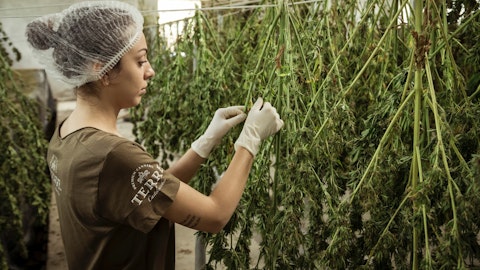Zach George: Yes. So, you are still seeing the impact of biomass revaluations. And with the rationalize of our cultivation and processing footprint, we are expecting to be in a position to have those reduced materially, if not eliminated in 2024. And so we will still likely see some noise impact our Q4 results. But we are trying to leave as much of that noise behind in 2023 and are looking forward to a much – presenting a much cleaner view on operations in 2024.
Unidentified Analyst: Okay. Thank you.
Operator: [Operator Instructions] Our next question comes from Pablo Zuanic of Zuanic & Associates. Please go ahead.
Pablo Zuanic: Thank you. Good morning everyone. Just first on the Liquor segment, Zach. When you look at some of your Canadian LP peers, one of them has been very acquisitive in the U.S., right, in terms of buying beer brands and liquid assets. As you continue to build the liquor business, I understand right now it’s retail, but now you are going to start producing your own wine, it seems you are buying, I suppose for the private label. Would be – with buying beer brands outside or wine brands outside of Canada or in Canada be part of the strategy as you grow that business?
Zach George: Good morning, Pablo and thanks for the question. Look, it’s a possibility if we were outside of Canada given Tied House and other regulations that would restrict us from doing so inside of Canada. But we are very focused on owning the consumer and creating strong retail experiences. And so there is nothing on our plate today that would suggest that we are taking a hard look at acquiring liquor brands in the U.S. or abroad.
Pablo Zuanic: Okay. Thank you. And then just moving on to cannabis operations, right? You are talking about becoming a major player. Obviously, you have the balance sheet to do so. I don’t know if you want to give an update in the need to scale up your M&A. I couldn’t tell from the filings where you still own the stake in Village Farms. But outside of EFF, I mean, it just to me that you need to scale up, especially if you are talking about trying to become a relevant player in international, any comments on that?
Zach George: Yes, it’s a great question. I think the long-term requirements for SNDL in terms of ownership or contracting to acquire quality, reasonably priced biomass is still somewhat up in the air. You see a lot of volatility in the Canadian market. Price compression has made procurement a very attractive opportunity for us. We are certainly committed to eliminating any exposure to high-cost cultivation and may look at other opportunities. We have disclosed that we have exited all of our material equity investments, but we will continue to look at strong low-cost, high-quality producers for potential opportunities in the future.
Pablo Zuanic: Got it. Thank you. And then just one last one in terms of SunStream USA, if I heard right, I think you mentioned that SunStream is sponsored by SNDL. But I mean, obviously, SNDL still owns 50% of SunStream, right? So, the question would be, I guess of the $550.5 million, how many are in assets that you are taking ownership of, right? It’s Parallel and SKYMINT, but not all of the portfolio you are equitizing, I suppose. And if you can give some color there, that would be helpful in terms of $550.5 million. But more important than that, if in the end, when we look at how Canopy growth has gone back and forth in terms of their own plans to – for Canopy USA, if in the end, you hit a wall in terms of trying to be Nasdaq-listed, equitizing those assets and having them in your books, would you consider just selling them to comply with the Nasdaq rules? Thank you.
Zach George: Thanks Pablo. Obviously, we are all working through an environment that is not a sellers’ market, okay. So, let’s just start with that, regardless of the scenario. But in this case, we are highly confident we have very reputable counsel that has worked on these issues with Nasdaq and sought and received approval under similar structures. I just want to remind you and the audience that our SunStream joint venture is structured such that SNDL as required does not engage in any plant touching activities in the United States. And we are a non-control participant in SunStream. So, think of it as a conventional sort of GP-LP, general partner, limited partner arrangement, where both SAF and SNDL are owners of the general partnership, but SNDL is the sole LP in that scenario.
And so we report based on a structure that would be similar to any alternative credit portfolio that you would see in the marketplace. And for that reason, we haven’t broken out a ton of detail on individual positions. If you look at the filings that are available in the U.S., you will see that, of that total balance, which again has also been adjusted for fair market value where we have written it down. Over half of that balance would be dedicated to positions that are going through equitization processes. And as you actually pointed out, we will likely see resolution in the other cases where we have large principal balances that should be coming back to us over the next 24 months. Some of these things are amortizing principal back to us today.
So, that would be a source cash for us in the future. And we don’t really – we don’t see a scenario where we aren’t able to get this done. I would just point to some of the differences between your reference to Canopy. The types of businesses that Canopy is acquiring is very different than the exposure that we have, right. So, if you take SKYMINT and Parallel, for example, these are two ones in SSO, ones in MSO, both started their lives as vertically integrated operators. So, not the same as tackling a product brand or producer in vape or edible categories, which has been a focus for Canopy as well. So, the path is one that had been well trodden, and we believe that we will have all the requisite support and consent from regulators and that would include our exchange Nasdaq.
So again, look forward to wrapping this up and closing in Q1, but we still have some wood to chop and a few more steps to take to close these transactions and finalize support from the Nasdaq.
Pablo Zuanic: That’s very helpful. Good color there. If I may, I am going to ask – add one in terms of Nova. I mean the outside it keeps on being extended, but obviously, as regulatory issue and the parties have agreed to do the deal, right? But is this more about you being plant-touching in Canada and now owning a retail chain, is that the issue? And how do you want to deal with that? That’s the last one. Thank you.
Alberto Paredero: Pablo, it’s a great question. Look, in terms of both parties, our tolerance for further delays is reaching its limits. Anyone who studies this industry or operates within it, understands just how frustrating the state-by-state and province-by-province, the regulatory ground game can be. So, we are not going to make additional comments at this time, but we are looking forward to updating investors in the near future.


